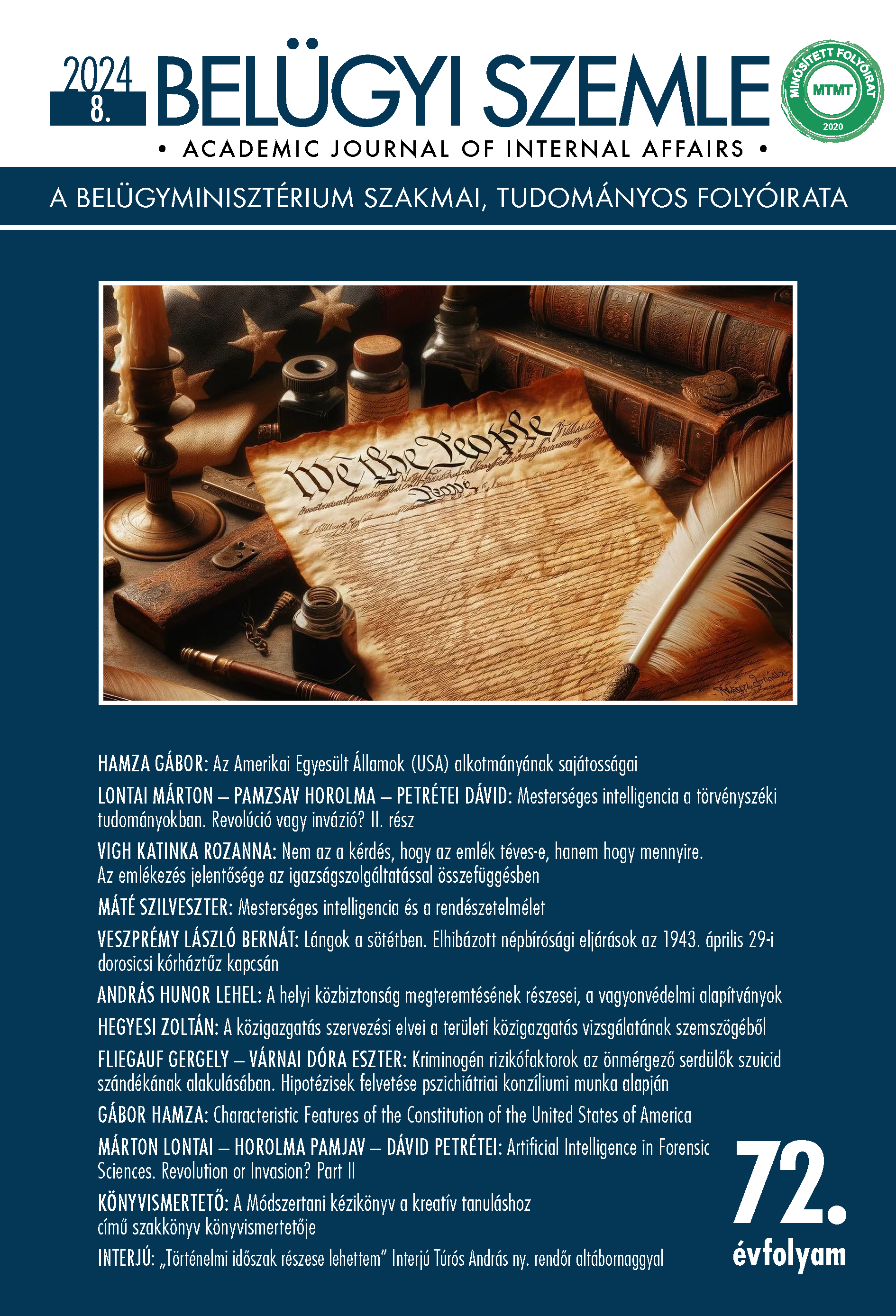Abstract
Aim: The aim of the study is to investigate the background and psychology of a problem that often occurs in the application of law and is therefore of outstanding theoretical and practical importance – the wrong verdict due to the false memory of witnesses – in order to avoid the biggest judicial failures (justizmord).
Methodology: The study was prepared by analysing international and Hungarian psychological theses and studies, describing relevant legal cases, and processing the international and domestic literature.
Findings: The complexity, fragility and influence of human memory must be kept in mind during the procedure of the participants of the justice system, as well as the interrogation techniques to promote adequate memory, so that false decisions cannot be made in the justice system.
Value: The credibility and accuracy of testimonies can be the key to finding out the material truth in the justice system, therefore the experiments described in the study and the techniques that support the testified testimony provide assistance to law enforcement.
References
Baddeley, A. (2001). Az emberi emlékezet. Osiris Kiadó.
Bower, H. G. (1981). Mood and memory. American Psychologist, 36(2), 129–148. https://doi.org/10.1037/0003-066X.36.2.129
Dürenmatt, F. (2003). Válogatott elbeszélések 5. Igazság-ügy. Európa Könyvkiadó.
Elek B. (2007). A vallomás befolyásolása a büntetőeljárásban. Doktori értekezés. Miskolci Egyetem Állam- és Jogtudományi Kar Deák Ferenc Állam- és Jogtudományi Doktori Iskola. http://midra.uni-miskolc.hu/document/5549/1139.pdf
Fenyvesi Cs. (2021). Büntetőeljárás-jogi és kriminalisztikai alapgondolatok a felismerésre bemutatásról – Finkey Ferenc nyomán. Erdélyi Jogélet, 2(1), 69–81. https://doi.org/10.47745/ERJOG.2021.01.07
Frank, J. (1973). Courts on Trial. Princeton University Press.
Godden, D. R. & Baddeley, A. D. (1975). Context-Dependent Memory In Two Natural Enviorements: On Land and Underwater. Brisith Journal Psychology, 66(3), 325–331. https://doi.org/10.1111/j.2044-8295.1975.tb01468.x
Hack P. & Hack M. (2005). A hiteles tanú. Új Exodus: teológiai és hitéleti folyóirat: A hit gyülekezetének folyóirata, 15(2), 49–53.
Hati Cs. (2015). Büntetőeljárásunk történeti alakulása – különös tekintettel a közvetlenség elvének érvényesülésére. Büntetőjogi Szemle, 3, 56–67.
Hebb, D. O. (1978). A pszichológia alapkérdései. Gondolat Kiadó.
Kránitz I. (2016). Eltérő téves emlékezeti paradigmák hatásának vizsgálata kisgyermek-, illetve serdülőkorban. Impulzus: Szegedi Pszichológiai Tanulmányok, 3(1), 1–22.
Kúria Büntető-Közigazgatási-Munkaügyi és Polgári Kollégiumai Joggyakorlat-Elemző Csoport (2017). Összefoglaló vélemény: Az ítéleti bizonyosság elméleti és gyakorlati kérdései. Kúria.
Nagy A. (2022). A büntetőeljárásban tett tanúvallomásra ható tényezők. Pázmány Law Working Papers, 1.
Nagy Varga A. (2009). Az emlékeink olyasvalamik, amelyekért hálásnak kell lennünk. Educatio, 4, 529–535.
Oláh A. (2006). Pszichológiai alapismeretek. Bölcsész Konzorcium.
Papp-Nagy Zs. (2019). Justizmord, avagy „az igazság megölése” a modern büntetőeljárásokban – Okok és következmények. Jogi Fórum.
Pődör L. (2018). Agatha Christie nehéz esete. Az emlékezés és a felejtés szerepe a ténymegállapítási folyamatban. In Bodnár K. & Fekete B. (szerk.), Iustitia meghallgat – Tanulmányok a „jog és irodalom” köréből (pp. 116–117). MTA Társadalomtudományi Kutatóközpont Jogtudományi Intézet.
Sági L. (2017). A krimináltaktika fejlődési tendenciái, új kihallgatási metódusok. Belügyi Szemle, 65(1), 45–64. https://doi.org/10.38146/BSZ.2017.1.3
Törő B. (2010). A kérdezés jelentősége a tanúvallomás során. Debreceni Jogi Műhely, 7(2), 60–70. https://doi.org/10.24169/DJM/2010/2/8
Varga M. (2018). A tanú emlékezetét befolyásoló verbális tényezők. Argumentum, 14, 415–428.
Varga M. (2020). Magyar büntetőperes bírósági kihallgatások komplex nyelvészeti elemzése. Doktori értekezés. Szegedi Tudományegyetem Nyelvtudományi Doktori Iskola. https://doktori.bibl.u-szeged.hu/id/eprint/10629/1/Varga%20Marianna%20PhD%20ertekezese.pdf
Vinnai E., Elek B. & Bencze M. (2012). A bírói ténymegállapítási folyamat szociológiája. In Vinnai E. & Bencze M. (szerk.), Jogszociológiai előadások (pp. 81). Debreceni Egyetemi Kiadó.

This work is licensed under a Creative Commons Attribution-NonCommercial-NoDerivatives 4.0 International License.
Copyright (c) 2024 Academic Journal of Internal Affairs

